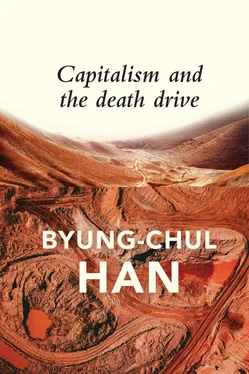Liveliness is friendliness. That life is friendly that is able to die.
Despite his ambivalent relationship with death, Freud is perfectly aware of the necessity of reconciling life with death. The unconscious repression of death must give way to the conscious acceptance of death:
Would it not be better to give death the place in reality and in our thoughts which it is due, and to give a little more prominence to the unconscious attitude towards death which we have hitherto so carefully suppressed? This hardly seems an advance to higher achievement, but rather in some respects a backward step – a regression; but it has the advantage of taking the truth more into account, and of making life more tolerable for us once again. 28
To affirm life means also to affirm death. Life that negates death negates itself. Only a form of life that returns death to life will liberate us from the paradox of undead life: we are too alive to die, and too dead to live .
1 1. Walter Benjamin, ‘The Work of Art in the Age of Its Technological Reproducibility’ (Second Version), in The Work of Art in the Age of Its Technological Reproducibility and Other Writings on Media, Cambridge, MA: Harvard University Press, 2008, pp. 19–55; here p. 42.
2 2. Arthur Schnitzler, Aphorismen und Betrachtungen, Frankfurt am Main: S. Fischer, 1967, pp. 177f.
3 3. Sigmund Freud, Civilization and Its Discontents, New York: W. W. Norton, 1962 [1930], pp. 58f.
4 4. Transl. note: following James Strachey’s translation of Freud’s works, and according to Laplanche and Pontalis’s The Language of Psychoanalysis, the English term for ‘Todestrieb’ is ‘death instinct’. Here, I shall use the term ‘death drive’. There are two reasons for this: it is by now more common in general academic usage, and it allows retaining the difference between ‘Instinkt’ (instinct) and ‘Trieb’ (drive).
5 5. Gilles Dostaler and Bernard Maris, Capitalisme et pulsion de mort, Paris: Albin Michel, 2010, p. 9. [‘La grande ruse du capitalisme, nous le verrons, est de canaliser, de détourner les forces d’anéantissement, la pulsion de mort vers la croissance.’]
6 6. Sigmund Freud, Beyond the Pleasure Principle, New York: W. W. Norton, 1990 [1920], p. 46.
7 7. Ibid., p. 47 (transl. modified).
8 8. Ibid.
9 9. Freud, Civilization and Its Discontents, p. 66.
10 10. Ibid.
11 11. Ibid., p. 68.
12 12. Freud, Beyond the Pleasure Principle, p. 47.
13 13. Cf. Luigi De Marchi, Der Urschock: Unsere Psyche, die Kultur und der Tod, Darmstadt: Luchterhand, 1988.
14 14. Georg Baudler, Ursünde Gewalt: Das Ringen um Gewaltfreiheit, Düsseldorf: Patmos, 2001, p. 116.
15 15. E. S. Craighill Handy, Polynesian Religion, Honolulu: Bernice P. Bishop Museum Bulletin 34, 1927, p. 31; quoted after Elias Canetti, Crowds and Power, New York: Continuum, 1962, p. 251.
16 16. Adalbert von Chamisso, The Wonderful History of Peter Schlemihl, London: Peter Hardwicke, 1861 (transl. amended), at http://www.gutenberg.org/files/21943/21943-h/21943-h.htm(accessed 26 March 2020).
17 17. Jean Baudrillard, Symbolic Exchange and Death, Los Angeles: Sage, 1993, p. 127.
18 18. Transl. note: ‘denn er bringt das Leben ums Leben’. ‘Ums Leben bringen’ is an expression that also means ‘to kill’.
19 19. Erich Fromm, The Anatomy of Human Destructiveness, New York: Holt, Rinehart and Winston, 1973, p. 350.
20 20. Baudrillard, Symbolic Exchange and Death, p. 177 (transl. amended).
21 21. Ibid., p. 37 (transl. modified).
22 22. Norman O. Brown, Life Against Death: The Psychoanalytical Meaning of History, Middletown, CT: Wesleyan University Press, 1959, p. 284.
23 23. Georges Bataille, Eroticism: Death and Sensuality, San Francisco: City Lights Books, 1986 [1957], p. 239.
24 24. Ibid., p. 11.
25 25. Baudrillard, Symbolic Exchange and Death, p. 156.
26 26. Theodor W. Adorno, Philosophische Terminologie, Frankfurt am Main: Suhrkamp, 1974, vol. 2, pp. 181f.
27 27. Theodor W. Adorno, Minima Moralia: Reflections from Damaged Life, London: Verso, 2005 [1951], pp. 77f.
28 28. Sigmund Freud, ‘Thoughts for the Times on War and Death’, Standard Edition, Vol. XIV, London: Hogarth Press and the Institute of Psycho-analysis, 1957 [1915], pp. 273–302; here p. 299.
Why Revolution Is Impossible Today
At a recent debate between me and Antonio Negri at the Schaubühne in Berlin, two ways of critiquing capitalism clashed head-on. Negri was enthusiastic about the possibility of global resistance against the ‘empire’, the ruling neoliberal system. He presented himself as a communist revolutionary and called me a ‘sceptical professor’. He emphatically invoked the ‘multitude’, the networked revolutionary masses and protest groups, apparently in the belief that this multitude could bring down the empire. To me, the revolutionary communist position seemed somewhat naïve and divorced from reality. I thus tried to explain to Negri why revolution is not possible today.
Why is the neoliberal system of rule so stable? Why is there so little resistance to it? Why does any resistance that emerges so quickly dissipate? Why, despite the growing gap between rich and poor, is revolution not possible? In order to explain this, we need a deeper understanding of how power and rule function today.
To establish a new system of rule, one must ensure there is no resistance. This is also true of the neoliberal system of rule. In order to inaugurate a new system of rule, what is needed is a positing power, and this often implies violence. But this positing power is not the same as the power that provides the system with its internal stability. It is well known that Margaret Thatcher, one of the pioneers of neoliberalism, regarded the trade unions as ‘the enemy within’ and fought violently against them. But this kind of violent assertion of the neoliberal agenda is not what constitutes neoliberalism’s system-preserving power.
The system-preserving power of the disciplinary, industrial society was oppressive. Factory workers were brutally exploited by factory owners, and this violent exploitation prompted protest and resistance. In that situation, a revolution that would overturn the ruling relations of production was a possibility. In that system, it was clear who the oppressors, as well as the oppressed, were. There was a concrete opponent, a visible enemy who could serve as the target of resistance.
The neoliberal system of rule is structured in an altogether different fashion. The system-preserving power is no longer oppressive but seductive. It is no longer as clearly visible as it had been under the disciplinary regime. There is no longer a concrete opponent, no one who is taking away the freedom of the people, no oppressor to be resisted.
Out of the oppressed worker, neoliberalism creates the free entrepreneur, the entrepreneur of the self. Today, everyone is a self-exploiting worker in his own enterprise. Everyone is both master and slave. The class struggle has been transformed into an internal struggle against oneself. Those who fail blame themselves and feel ashamed. People see themselves, rather than society, as the problem.
Disciplinary power, attempting to control people by force, by subjecting them to a dense matrix of orders and prohibitions, is inefficient. Much more efficient is that technique of power that ensures that people subordinate themselves to the system of rule voluntarily. The exceptional efficiency of this technique derives from the fact that it does not work through prohibition and deprivation but through pleasure and fulfilment. Instead of making people docile, it tries to make them dependent. This neoliberal logic of efficiency also applies to surveillance. In the 1980s, people still protested en masse against the census. Even schoolchildren took to the streets.
Читать дальше












